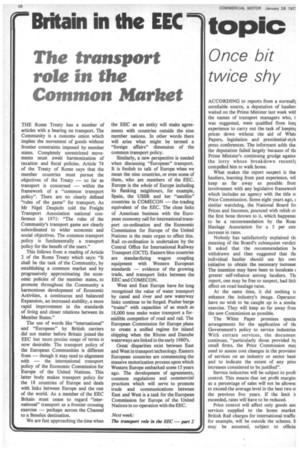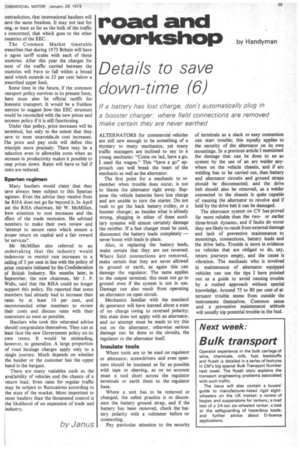Once bit twice shy
Page 40

Page 41

If you've noticed an error in this article please click here to report it so we can fix it.
ACCORDING to reports from a normally unreliable source, a deputation of haulier; waited on the Prime Minister last week wit'. . the names of transport managers who, i was suggested, were qualified from loni experience to carry out the task of keeph prices down without the aid of Whit( Papers, legislation and presidential-styli press conferences. The informant adds tha the deputation failed largely because of flu Prime Minister's continuing grudge agains the lorry whose breakdown recently compelled him to walk home.
What makes the report suspect is thai hauliers, learning from past experience, wil keep as far away as possible fron involvement with any legislative frameworl which includes an agency with the title a Price Commisssion. Some eight years ago, I similar watchdog, the National Board foi Prices and Incomes, pounced with relish or the first bone thrown to it, which happenee to be a recommendation by the Roac Haulage Association for a 5 per cert increase in rates.
Nobody has satisfactorily explained tls meaning of the Board's subsequent verdict It asked that the recommendation Ls withdrawn and then suggested that thi individual haulier should use his owr initiative to obtain the necessary increase The intention may have been to inculcate greater self-reliance among hauliers. Thi report, one may be free to suspect, had hull effect on road haulage rates.
At the same time, it did nothing t( enhance the industry's image. Operator have no wish to be caught up in a simila exercise. They will keep as far away fron the new Commission as possible.
The White Paper promises specia arrangements for the application of tin Government's policy to service industries With certain services, the documeir continues, "particularly those provided by small firms, the Price Commission may need to assess cost changes in the provisior of services on an industry or sector bash and to indicate the extent of any pric( increases considered to be justified".
Service industries will be subject to profi control. This means that net profit margiru as a percentage of sales will not be allowec to exceed the average level in the best two a the previous five years. If the limit li exceeded, rates will have to be reduced.
Price control will affect only goods ant .services supplied to the home market British Rail charges for international traffic for example, will be outside the scheme. li may be assumed, subject to officia
;ontradiction, that international hauliers will lave the same freedom. It may not last for ong, at least as far as the bulk of the traffic s concerned, that which goes to the other :ountries of the EEC..
The Common Market timetable prescribes that during 1973 Britain will have o agree tariff scales with each of those :ountries. After this year the charges for nost of the traffic carried between the :ountries will line to fall within a broad and which extends to 23 per cent below a prescribed upper limit.
Some time in the future, if the common ransport policy survives in its present form, here must also be official tariffs for iomestic transport. It would be a fruitless ntercise to suggest how this EEC structure would be reconciled with the new prices and ncomes policy if it is still functioning.
Under that policy, price increases will be permitted, but only to the extent that they lave to meet unavoidavole cost increases. rhe price and pay code will define this 3rinciple more precisely. There may be a .eduction even in allowable costs when an ncrease in productivity makes it possible to ceep prices down. Rates will have to fall if :osts are reduced.
Spartan regimen Many hauliers would claim that they lave always been subject to this Spartan .egimen. Even the advice they receive from he RHA does not go far beyond it. In April ast the RHA chairman, Mr W. McMillan, :hew attention to cost increases and the :ffect of the trade recession. He advised members to make their own review and 'attempt to secure rates which ensure a proper return on capital and a fair reward 'hr services".
Mr McMillan also referred to an undertaking that the industry would endeavour to restrict rate increases to a ceiling of 5 per cent in line with the policy of price restraint initiated by the Confederation of British Industry. Six months later, in September, the new chairman, Mr J. P. Wells, said that the RHA could no longer support this policy. He reported that some members had already had to increase their rates by at least 10 per cent, and recommended other members to review their costs and, discuss rates with their customers as soon as possible.
Hauliers who took this reiterated advice should congratulate themselves. They can at least face the new Government policy on its own terms. It would be misleading, however, to generalize. A large proportion of road haulage charges apply only to a single journey. Much depends on whether the haulier or the customer has the upper hand in the bargain.
There are many variables such as the availability of vehicles and the chance of a return load. Even rates for regular traffic may be subject to fluctuations according to the state of the market. More important to most hauliers than the threatened control is the likelihood of an expansion of trade and industry.
by Janus




























































































